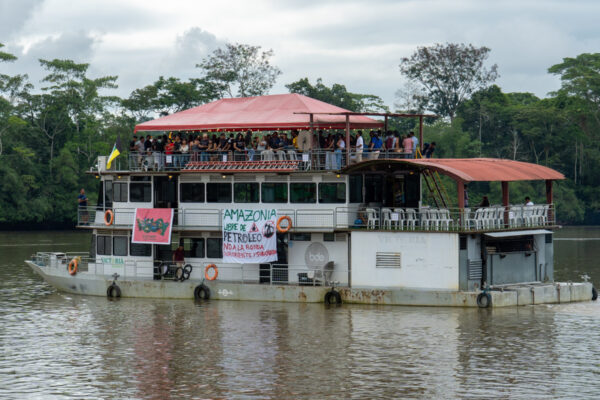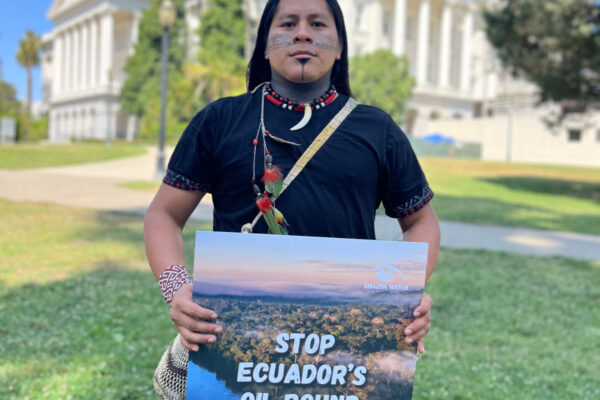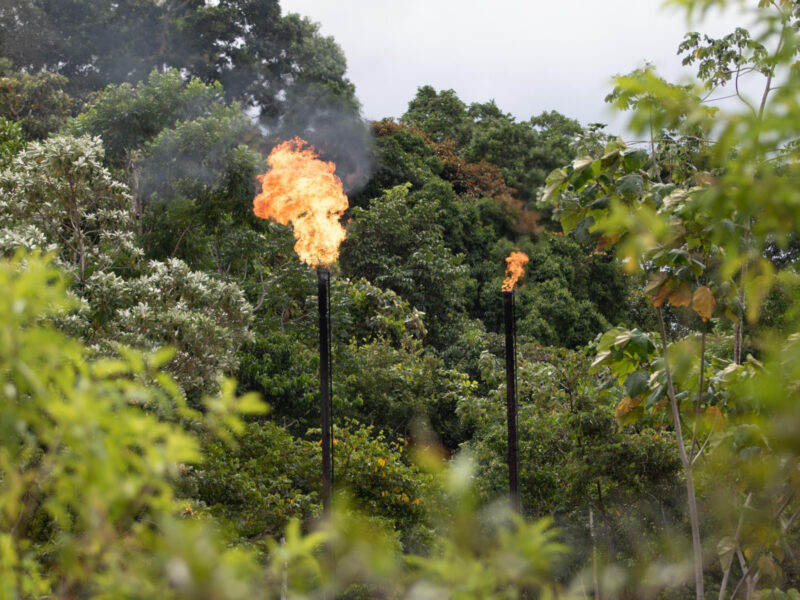On an airplane heading to the city of Talara on the north coast of Perú, dry mountains filled the view of my small airplane window. I asked Ricardo, my colleague, if the area used to be covered in some sort of forest or greenery. It was in the past, he said: dry forests acclimated in this region used to exist. But now, due to warming and the pervasiveness of extractive industries like oil, only an arid landscape remains.
The plane soon started to u-turn, positioning itself to land. It was then that I could make out a figure in the distance that juxtaposed the vast Pacific Ocean next to it: a gigantic structure, with infinite pillars and pipes and spewing black smoke. The large, dystopian structure was ostensibly bigger than the surrounding city, which paled in comparison in size. That looming figure was Petroperú’s Talara Refinery.
As a finance campaigner for the past year, one of my main roles has been to support our End Amazon Crude campaign, and work on stopping new finance for state-run oil company, Petroperú. This was my first time ever visiting Perú.
I had two main reasons for my visit: first, to support the meetings of the MarAmazonía alliance in the leadup to an April delegation heading to the United States, and second, to visit sites of Petroperú’s oil activities in the city of Talara, and oil sites in Cabo Blanco, both located in the northern coast of the country.
The MarAmazonía alliance
The MarAmazonía alliance geographically defies many odds, and comes at a time when scales need to be tipped in, well, Earth and humanity’s favor. “Mar,” in Spanish, means the sea, whereas “Amazonía” refers to the Amazon. This alliance is composed of artisanal fishing guilds that live in the north coast of Perú, impacted by existing and former sites of offshore oil drilling, as well as three Indigenous nations from the Peruvian Amazon – the Wampís, Achuar, and the Chapra Nations – whose lands are now in imminent danger of oil exploitation by Petroperú.
Despite the Andes mountain range and hundreds of miles dividing them, both communities of the MarAmazonía alliance have suffered the impacts of toxic oil contamination spanning decades, which has yet to be recognized or compensated for by the state. Additionally, leaders from these communities face increased threats for their ongoing resistance.
Enablers of this industry, and particularly Petroperú, come from the Global North – financial institutions like banks from the United States and Europe, which ironically herald rights and climate commitments. These banks include JPMorgan Chase, Citi, and Bank of America. The MarAmazonía alliance, which seeks to go to the United States in April to confront banks about its financing of Petroperú, looks to cut this money pipeline for good.
Refineries and the toxic legacy of oil
Upon landing in Talara, we headed to the hostel along with Olivia Bisa, President of the Chapra, Senar Irar, President of the Achuar, and Neil Encinas, an elected representative from the Wampís. The closer we got, the clearer the refinery came into view. And, so did its flaring. We stayed right next to the refinery. It was next to the town, where local shops, homes, and restaurants were located. Kids practiced a traditional dance from the Andes, with fast footwork and music with a steady beat, as the toxic fumes filled the air.
“Welcome to the oil capital of Perú,” said Vladimir, another colleague of mine. It turns out that the city of Talara was the place where one of the first oil wells was drilled in all of South America, dating back to 1863. The toxic legacy of oil was evident.
The site was akin to that of my hometown in Richmond, CA, in the United States, where I immigrated to at a young age. Located in Richmond is another monstrous refinery – the Chevron refinery – where crude from the Ecuadorian Amazon is likely refined. This city is home to many Black and brown families, as well as immigrant families who come to the United States to live a better life. Instead, what people get instead is air that poisons their bodies for the rest of their lives, causing chronic health issues and, in the worst cases, higher likelihood of life-threatening illnesses like cancer.
The existing oil contamination in Talara, on top of the refinery’s non-stop pollution in the region, most likely parallels these adverse health impacts, all while Petroperú brazenly claims that it produces “sustainable fossil fuels.” Bank representatives, of course, callously buy into this narrative.
The city of Talara: Yes to Life (and ceviche), No to Oil
The first set of activities at Talara was a community assembly composed of MarAmazonía, Peruvian civil society, and community members, who varied in ages. The assembly included around 100 to 150 attendees and a packed program for the day.
Discussion points included talking about the links between commercial banks and insurance to Petroperú. After presenting in front of the room, unsure if what I had presented was the least bit helpful, a handful of youth stood up and started reciting figures of the thousands of unremediated oil spills and wells in their city, then thanked me for sharing the information. During this exchange, a young girl said, “These banks are financing the murder of our people.”
Those in the room then discussed local, national, and international strategies to not only combat more oil activities from destroying their livelihoods, but also to achieve remediation from the government for past harms from oil activities. Olivia, with a fierce but grounding presence, said that we must not be fearful, citing that she has been the target of threats and criminalization for her activism against Petroperú. Her statement and leadership strongly resonated with those in the room.
The assembly generated much enthusiasm, and then community members gathered and began making signs in preparation for a protest at the Talara refinery. The rally began with the elderly activists leading the charge, followed by Olivia, Senar, and Neil, who held a big banner that read, “Sí al Vida! ¡No al Petróleo!” or “Yes to Life! No to Oil!” In addition, they also playfully chanted “Ceviche sí! Petróleo no!” In English this translates to, “Yes to ceviche, no to oil!” This was a humorous testament to their love for ceviche, how food represents life, and the fervent opposition against oil and those who finance it. The assembly and subsequent protest was an exhilarating one, a show of solidarity that envisions a future free from oil and extraction.
Cabo Blanco and the sea
The second line of programmatic events was at the city of Cabo Blanco, an hour or two bus ride from Talara. The city is proudly known to many locals as the inspiration for Ernest Hemingway’s “The Old Man and the Sea,” and it was once known as a biodiversity hotspot. However, oil exploitation and contamination have drastically impacted the marine environment and subsequently, fishing communities that rely on it to make a living. Similar contamination occurs throughout the Peruvian Amazon.
As we approached the city, the ocean became visible again, and so did little specs atop the water. These dots in the faraway distance were remnants of former offshore drilling platforms, surrounded by fishing boats. Little to no oil was successfully extracted from these sites, yet Petroperú hopes to install new ones in the neighboring offshore blocks. Here we would meet the city’s artisanal fishing community and perform our demonstrations not on land, but on boats at sea.
We made our way to the port, where fishermen cleaned newly caught fish and sea turtles emerged from the water to greet us. After docking on the boats with large banners, we made our way to the former oil sites at sea that have yet to be dismantled. On our way there, Carlos Chapiquillen, former president of the fishing association, began describing the oil platforms and his way of life.
Approaching the sites, the MarAmazonía alliance and the Indigenous delegates joined hands and held banners out in the middle of the ocean, with the offshore oil platforms behind them. They began chanting, “¡MarAmazonía! ¡Libre de petróleo!” (“MarAmazonía! Free of oil!”) proving that not even the sea can quell the demands of the communities. Once the demonstration ended, we came back to shore and gathered once again for lunch, with an unspoken consensus that the work only continues from here.
Where do you fit into the story?
Now that I am back in the United States in the Bay Area, the words of an elderly woman in the assembly at Talara still echoes in my heart and mind: “We’ve been living in these conditions for years – decades even – and hope that something does change. I hope you guys aren’t all talk.”
I knew that I wasn’t the only intended receiver of that message. Rather, it was me, my colleagues, and all the folks reading this article now. Especially those who live in the United States, where many financial institutions remain complicit in aiding Petroperú and Perú’s broader oil industry. Supporting our Indigenous partners and the MarAmazonía alliance in holding these banks accountable is where you fit into the story.
The MarAmazonía alliance recently sent a letter to the world’s largest U.S. banks, condemning a potential for up to $1 billion of new financing for Petroperú on top of the company’s existing $6.5 billion in debt for its Talara Refinery. JPMorgan Chase and Citi, two of largest financiers of fossil fuels across the planet, were linked to this potential financing. As Petroperú grows more desperate for cash to sustain itself, the alliance seeks to meet again with the banks at the end of April – this time, with higher ranking executives who hold more decision-making power.
In solidarity with the Indigenous nations and the broader MarAmazonía alliance, please send a message to banks in support of Indigenous nations demanding an end to the financing of Amazon destruction!













